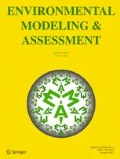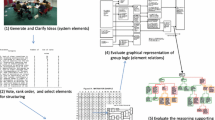Abstract
Participatory Integrated Assessment (PIA) is an approach which aims at developing methods which allow to combine evaluations of experts and lay people in the field of Integrated Assessment. Thus, policy recommendations derived from PIA exercises are informed by scientific judgments and by valuations of “non-scientists”. For any PIA methodology the provision of insights, facts and figures about the policy problem at hand is crucial.
In this paper we describe a PIA methodology which combines the social science research instrument “focus group” with a specific computer information tool, the “Personal CO2 Calculator” (PCC). The tool supports citizens in discussing and recommending measures on climate change policy. Based on our experiences, we plead for information instruments that are tuned to and assist concrete target groups with their specific interests. This helps that policy recommendations derived from PIA exercises are based on both scientific knowledge as well as citizens' and stakeholders' policy preferences.
Similar content being viewed by others
References
B.R. Barber, Strong Democracy. Participatory Politics for a New Age (University of California Press, Berkeley, 1984).
A. Biedermann, Persönliche Energie-und CO2-Bilanz [Personal energy-and CO2-Balance], Greenpeace Schweiz 30 (1992).
S. Boehmer-Christiansen, Global climate protection policy: the limits of scientific advice, Global Environmental Change 4(2) (Part I) and 4(3) (Part II) (1994) 140–159, 185–200.
J.P. Bruce, H. Lee and E.F. Haites, eds., Climate Change 1995 — Economic and Social Dimensions of Climate Change, Contribution of Working Group III to the Second Assessment Report of the Intergovernmental Panel on Climate Change (Cambridge, 1996) pp. 367–396.
J.P. Bruce, H. Lee and E.F. Haites, eds., Climate Change 1995 — Economic and Social Dimensions of Climate Change, Contribution of Working Group III to the Second Assessment Report of the Intergovernmental Panel on Climate Change (Cambridge, 1996) pp. 377–382.
U. Dahinden and G. Dürrenberger, Public participation in energy policy. Results from focus groups, in: Risk Perception and Communication in Europe, ed. O. Renn (Stuttgart Society of Risk Analysis — Europe Center of Technology Assessment in Baden-Würthenberg, 1997) pp. 487–514.
P.C. Dienel, Die Planungszelle. Der Bürger plant seine Umwelt. Eine Alternative zur Establishment-Demokratie Planning Cells [Citizens Plan Their Environment. An Alternative to the Establishment Democracy] (Westdeutscher Verlag, Opladen, 1993).
J.S. Dryzek, Discursive Democracy. Politics, Policy, and Political Science (Cambridge University Press, Cambridge, 1990).
G. Dürrenberger, J. Behringer, U. Dahinden, A. Gerger, B. Kasemir, C. Querol, R. Schüle, D. Tabara, F. Toth, M. van Asselt, D. Vassilarou, N. Willi and C. Jaeger, Focus Groups in Integrated Assessment: A Manual for a Participatory Tool (Center for Interdisciplinary Studies in Technology, Darmstadt University of Technology, 1997).
G. Dürrenberger, H. Kastenholz and J. Behringer, Integrated assessment focus groups: Bridging the gap between science and policy?, Science and Public Policy, forthcoming.
F. Fischer, The rationality project: Policy analysis and the postpositivist challenge, Policy Studies Journal 17(4) (1989) 941–951.
F. Fischer, Citizen participation and the democratization of policy expertise: From theoretical inquiry to practical cases, Policy Sciences 26 (1993) 165–187.
J.S. Fishkin, The Voice of the People. Public Opinion and Democracy (Yale University Press, New Haven, 1995).
K.P. Frederick, Integrated assessments of the impacts of climate change on natural resources. An introductory essay, Climatic Change 28 (1994) 1–14.
T.L. Greenbaum, The Handbook of Focus Group Research (Lexington, New York, 1993).
D. Held, Prospects for Democracy (North, South, East, West, Cambridge, 1993).
B. Kasemir, C. Jaeger and G. Dürrenberger, Embedding integrated assessment models in social discourse, Science and Public Policy 23(2) (1996) 124–125.
J. Kitzinger, The methodology of focus groups: The importance of interaction between research participants, Sociology of Health and Illness 16(1) 103–121.
R.A. Krueger and D.L. Morgan, The Focus Group Kit (Sage, London, 1998).
E. Liebow, K. Branch and C. Orians, Perceptions of hazardous waste incineration risks: Focus group findings, Sociological Spectrum 13(1) (1993) 153–173.
R.K. Merton, The focused interview and focus groups. Continuities and discontinuities, Public Opinion Quaterly 4 (1987) 550–566.
J.W.D. Morecroft and J.D. Sterman, Modelling for Learning Organizations (Productivity Press, Portland, 1994).
D.L. Morgan, Successful Focus Groups. Advancing the State of the Art (Sage Publications, Newbury Park, 1993).
D.L. Morgan, The Focus Group Guidebook. Focus Group Kit (Sage Publications, Thousand Oaks, 1998).
G. Morgan and H. Dowlatabadi, Learning from integrated assessment of climate change, Climatic Change 34 (1996) 337–368.
P.M. Morrisette, J. Darmstadter, A.J. Plantinga and M.A. Toman, Prospects for a global greenhouse gas accord. Lessons from other agreements, Global Environmental Change (June 1991) 209–223.
Öko Check per Mausklick [Ecological checks on a mouseclick], Test 2 (1998) 72–73.
C. Pahl-Wostl, M. van Asselt, C. Jaeger, S. Rayner, C. Schaer, D. Imboden and A. Vckovski, Integrated assessment of climate change and the problem of indeterminacy, in: Climate and Environment in the Alpine Region — An Inter-Disciplinary View, eds. P. Cebon, U. Dahinden, H. Davies, D. Imboden and C. Jaeger (MIT Press, Boston, in press).
C. Pateman, Participation and Democratic Theory (Cambridge University Press, London, 1974).
A.G. Pereira, C. Gough and B. De Marchi, Computers, citizens and climate change — The art of communicating technical issues, International Journal of Environment and Pollution, submitted.
O. Renn et al., Fairness and Competence in Citizen Participation. Evaluating Models for Environmental Discourse (Kluwer, Dordrecht, 1995).
F. Reusswig, Lebensstile und Oekologie. Gesellschaftliche Pluralisierung und alltagsökologische Entwicklung unter besonderer Berücksichtigung des Energiebereichs [Lifestyles and Ecology. Pluralisation of Society and Ecological Development in Everyday Life, in Special View of Energy Circumstances] (Institut für Sozial-Ökologische Forschung, Verlag für Interkulturelle Kommunikation, Frankfurt am Main, 1994).
J.B. Robinson, Of maps and territories — The use and abuse of socioeconomic modeling in support of decision making, Technological Forecasting and Social Change 42 (1992) 147–164.
J. Rotmans and M. van Asselt, Integrated Assessment: A growing child on its way to maturity, Climatic Change 24 (1996) 327–336.
J. Rotmans and H. Dowlatabadi, Integrated Assessment of climate change: Evaluation of models and other methods, in: Human Choice and Climate Change: An International Social Science Assessment, eds. S. Rayner and E. Malone (1997).
A. Rueede, Laienwissen unter der Lupe [Keeping a Close Eye on Layperson's Knowledge] (EAWAG, Dübendorf, 1997).
P.A. Sabatier, An advocacy coalition framework of policy change and the role of policy oriented learning therein, Policy Sciences 21 (1988) 121–168.
P.A. Sabatier, Toward better theories of the policy process, Political Science and Politics 24 (1991) 147–156.
D.A. Stone, Policy Paradox and Political Reason (Foresman, Glenville, 1988).
P. Vellinga (Institute for Environmental Studies, University of Amsterdam), European Forum on Integrated Environmental Assessment, Paper presented at the Mega Science Meeting in Stockholm (4–6 March 1998).
J.A.M. Vennix, Group Model Building (Wiley, Chichester, 1996).
M. Waldrop, Complexity. The Emerging Science at the Edge of Order and Chaos (Penguin, London, 1994).
B. Wynne and S. Shackley, Environmental models — Truth machine or social heuristics, The Globe 21 (September 1994).
Author information
Authors and Affiliations
Rights and permissions
About this article
Cite this article
Schlumpf, C., Behringer, J., Dürrenberger, G. et al. The personal CO2 calculator: A modeling tool for Participatory Integrated Assessment methods. Environmental Modeling & Assessment 4, 1–12 (1999). https://doi.org/10.1023/A:1019035527638
Issue Date:
DOI: https://doi.org/10.1023/A:1019035527638




